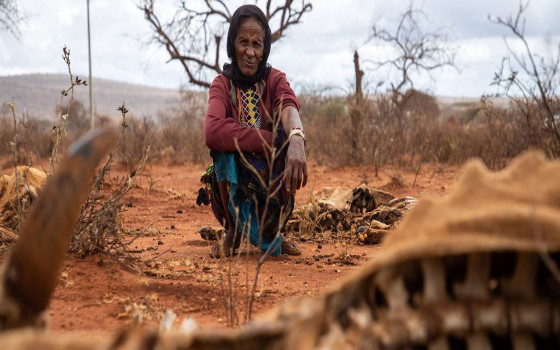
Davos warns of losses amounting to $12.5 trillion and the death of 14.5 million people due to climate change.

- Europe and Arabs
- Tuesday , 16 January 2024 18:57 PM GMT
Davos: Agencies
A new analysis from the World Economic Forum currently being held in Davos, Switzerland, warned that severe natural disasters resulting from climate change could lead to economic losses worth $12.5 trillion and the loss of about 14.5 million people by 2050.
This came in a press release issued on the forum’s website. The analysis said that the climate crisis will exacerbate global health inequalities, making the most vulnerable groups more vulnerable to risk. Therefore, urgent global action must be taken to reduce emissions and protect human health from negative impacts. The multifaceted aspects of global climate change.
The statement stated that despite the stark results, there is still time for global stakeholders to take decisive strategic action to confront these expectations and mitigate the health impacts of climate change globally. According to what was reported by the Middle East News Agency and published by the Youm 7 website in Cairo.
The report, titled “Measuring the Impact of Climate Change on Human Health” and prepared in collaboration with the world’s leading management consulting firm, Oliver Wyman, analyzed the climate crisis through a new lens by providing a detailed picture of the indirect impact of climate change on health. Human, Global Economy, and Healthcare and provide actionable strategies to mitigate and prepare for this looming threat.
“While there has been much debate about the impact of climate change on nature and the global economy, some of the most pressing consequences of rising global temperatures will be on human health and the healthcare system,” said Shyam Bishin, Head of the United Nations Development Program and a member of the Executive Committee of the World Economic Forum. “Recent progress will be lost unless critical emissions reduction and mitigation measures are improved, and decisive global action is taken to build health systems resilient to climate change.”
The analysis identified the health consequences of climate change, both in terms of health outcomes such as deaths and health lives lost and the economic costs to the health care system, estimated at an additional $1.1 trillion in additional costs by 2050, based on scenarios developed by the Intergovernmental Panel on Climate Change (IPCC). On the most likely path for the planet's average temperature to rise from 2.5 to 2.9 degrees Celsius above pre-industrial levels.
The report analyzed six major categories of climate-related events as key multifaceted drivers of negative health impacts: floods, droughts, heat waves, tropical storms, wildfires and rising sea levels. Floods were found to pose the highest acute risk of climate-related mortality, estimated to be responsible for 8.5 million deaths by 2050 and drought, indirectly linked to extreme heat, constitutes the second largest cause of mortality, with 3.2 million people expected to die. Also, heat waves could cause the largest economic losses, estimated at $7.1 trillion by 2050, due to lost productivity. Excess deaths attributable to air pollution, caused by fine particulate matter and ozone pollution, are expected to be the largest contributor to premature death at nearly 9 million deaths annually.
The analysis warned that climate change will further entrench global health inequalities, as the most vulnerable population groups, including women, youth, the elderly, low-income groups and hard-to-reach communities, are the most affected. It stressed that regions such as Africa South Asia faces increasing vulnerability to the impacts of climate change, which is exacerbated by limited existing resources, adequate infrastructure and basic medical equipment, further complicating its ability to confront and adapt to environmental challenges.












No Comments Found